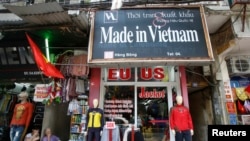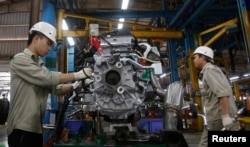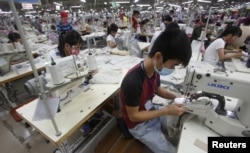A wider Sino-U.S. trade dispute would help export-reliant Vietnam compete against Chinese companies but put the country at risk of any global fallout, analysts say.
The numerous exporters in Vietnam that ship manufactured goods to the United States would save money compared with Chinese peers if not subject to American tariffs, said Dustin Daugherty, senior associate with business consultancy Dezan Shira & Associates in Ho Chi Minh City.
The U.S. government said this month it would develop a list of tariffs on up to $60 billion in Chinese imports. China has threatened to impose its own in response.
“Let’s say (the United States) went the more traditional route, tensions kept escalating and more tariffs are slapped on Chinese products,” Daugherty said. “In that case Vietnam’s export sector definitely benefits. We’re already seeing the U.S. being very warm to Vietnam and U.S. businesses keen on doing business with Vietnam.”
But Chinese firms hit by tariffs might flood Vietnam with raw materials for local manufacturing, while overall world market volatility caused by a Sino-U.S. trade dispute could hamper the country’s trade, said Carl Thayer, emeritus professor at the University of New South Wales in Australia.
A tariff-free Vietnam scenario
Vietnamese exporters would save money compared to their Chinese peers if the U.S. government placed tariffs on Chinese firms alone without touching their cross-border supply chains, Daugherty said.
The government of U.S. President Donald Trump calls China unfair in its trade practices, the Office of the U.S. Trade Representative says on its website. China enjoys a $375 billion trade surplus with the United States.
Vietnam counts the United States as its top single-country export destination and it shipped $46.484 billion worth of goods to that market last year.
Vietnamese officials have carved out an investment environment since the 1980s that hinges on low costs for manufacturers. American-invested factories such as a Ford Motor plant and an Intel chip factory are among those active in Vietnam today.
Foreign investment contributed to exports worth $155.24 billion in 2017, financial services firm SSI Research in Hanoi says. Vietnam’s economy grew about 7 percent in the first quarter this year, it says.
Attractive investment
Vietnam would be a more attractive investment compared with China under higher U.S. tariffs, analysts say.
Some new investors might be formerly China-based firms hoping to flee the tariffs, said Song Seng Wun, an economist in the private banking unit of CIMB in Singapore.
China itself might offer Vietnam, along with other countries, preferential trade policies or infrastructure help to shore up trade ties, some believe. Stronger trade relations outside the United States would help China offset any tariff damage, Daugherty said.
This week China’s commerce minister pledged to relax trade rules affecting India.
Specter of a broader trade war
U.S. import tariffs that hit China’s extensive cross-border supply chain would hurt Vietnam as a place that finishes Chinese goods for final export, Thayer said. It’s unclear whether Washington would tax Chinese firms alone or their wider supply networks.
Chinese firms already co-invest with Vietnamese partners, Song said, and supply chains for goods such as consumer electronics can net multiple countries, not just China.
More co-investment might follow if Vietnam can offer shelter from tariffs. But Sino-Vietnamese political tension over a maritime dispute risks giving Vietnamese firms a bad name at home if they work too extensively with Chinese partners.
“I would say there will be all kinds of repercussions and implications just because of the very integrated supply chain in the world these days,” Song said. “Take an Apple phone as an example. Parts from here and there are assembled in China.”
Steel, aluminum tariffs
U.S. steel and aluminum tariffs that took effect last week cover much of the world including China and Vietnam. Vietnam exported 380,000 tons of steel, worth $303 million, to the United States in 2017, domestic news website VnExpress International says.
Chinese firms hit by the range of tariffs being mulled now in Washington might boost sales to Vietnam, Thayer said. Chinese sellers of raw materials for Vietnamese exports could dump goods into Vietnam to keep up their own balance sheets as U.S. tariffs hurt them, he added.
Chinese sellers often have an economy of scale that lets them sell for less in Vietnam than local vendors do. Vietnam counts China as its top trading partner.
An escalation of Sino-U.S. trade tensions could also chill global markets or trade as a whole, some analysts fear. That fallout could slow global growth, he said.
“Disruption to trade shouldn’t affect Vietnam overall, but it’s the way the entire globe is reacting to this that I think could affect Vietnam,” he said. “Vietnam is overall heavily committed to global integration with a number of partners, so disruption along that way would have an effect.”









